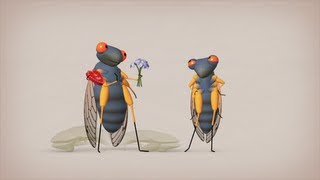(单词翻译:单击)
If you live on the east coast of the United States,
如果你住在美国东海岸,
you've spent the last 17 years of your life walking, eating and sleeping above a dormant army of insects.
那过去的17年里,你走路、吃饭、睡觉,都在一支休眠的昆虫大军之上。
These are the cicadas. Every 17 years, billions of them emerge from the ground to do three things: molt, mate and die.
这些昆虫是蝉。每17年,数十亿计的蝉从地下涌出来做三件事:蜕壳,交配以及死亡。
There are 15 different broods of cicadas out there, grouped by when they'll emerge from the ground.
共有15窝不同的蝉,根据它们的出现时间来区分。
Some of these broods are on a 13-year cycle, others are on a 17-year clock.
有些蝉窝的周期是13年,而另一些是17年。
Either way, the cicadas live underground for most of their lives, feeding on the juices of plant roots.
不管是哪一种,蝉的生命的大部分时间都生活在地下,依靠植物根的汁液存活。
When it's time to emerge, the adults begin to burrow their way out of the ground and up to the surface,
等到要出现的时候,成虫会开始挖掘离开地下的通道,直到地面,
where they'll live for just a few weeks.
在那里它们将生活仅仅数周。
During these weeks, though, everybody will know the cicadas have arrived.
但是,在这几周里,所有人都会意识到蝉来了。
There will be billions of them. And they're loud.
它们有数十亿。而且它们很吵。
Male cicadas band together to call for female mates,
雄性蝉集结在一起,来呼唤雌性配偶,
and their collective chorus can reach up to 100 decibels -- as loud as a chain saw.
它们的合唱可以高达100分贝,就像电锯的声音一样大。
In fact, if you happen to be using a chain saw or a lawn mower,
事实上,如果你正在使用电锯或是割草机,
male cicadas will flock to you, thinking that you're one of them.
雄性蝉会向你集结而来,以为你是它们的一份子。
Now, like most things in nature, the cicadas don't arrive without a posse.
和自然界的大部分东西一样,蝉的到来也不孤单。
There are all sort of awesome and gross predators and parasites that come along with the buzzing bugs.
随着这些吵闹的虫子一起到来的,还有各种可怕而又恶心的捕食者和寄生虫。
Take the fungus Massospora for example.
以团孢霉属的真菌为例。

This little white fungus buries itself in the cicada's abdomen and eats the bug alive, leaving behind its spores.
这些白色的真菌将自身藏匿在蝉的腹中,侵蚀蝉并留下孢子。
When those spores rupture, they burst out of the still-alive cicada,
当这些孢子破裂时,它们会从依然活着的蝉的体内爆出,
turning the bug into a flying saltshaker of death, raining spores down upon its unsuspecting cicada neighbors.
把这种虫子变为一个播撒死亡的飞行盐罐,将孢子洒向临近的毫无戒备的蝉。
But while we know pretty precisely when the cicadas will arrive and fade away, we're still not totally certain of why.
虽然我们精确地知晓蝉何时会出现和消失,但我们仍然不完全了解其原因。
There are certain advantages to having your entire species emerge at once, of course.
当然,让整个种群一下子出现是有一定好处的。
The sheer number of cicadas coming out of the ground is so overwhelming to predators,
从地下涌出的蝉的数量如此之多,对掠食者而言声势浩大,
it is essentially guaranteed that a few bugs will survive and reproduce.
这本质上保证了总有一些虫子可以存活并繁衍。
And since cicadas emerge every 13 or 17 years, longer than the lifespan of many of their predators,
由于蝉每13年或17年才出现,这比很多捕食者的寿命都要长,
the animals that eat them don't learn to depend on their availability.
所以吃它们的动物会学着不去依赖它们生存。
But why 13 and 17 years, instead of 16 or 18 or 12?
但是,为什么是13年或17年?为什么不是16年?或是18年?或是12年?
Well, that part no one really knows.
这个没人真的知道。
It's possible the number just happened by chance, or, perhaps, cicadas really love prime numbers.
有可能这些数字只是巧合,也有可能是蝉真的很喜欢质数。
Eventually, the cicadas will mate and slowly die off, their call fading into the distance.
最终,蝉会交配并慢慢死去,它们的声音会渐渐弱下去。
The eggs they lay will begin the cycle again,
它们所产的卵会开始新的周期,
their cicada babies burrowing into the earth, feeding on plant juice,
蝉的幼虫会进入地下,以植物汁液为食,
and waiting for their turn to darken the skies and fill the air with their songs.
等待它们的时刻来遮盖天际,将它们的歌声弥漫各处。
In 17 years, they'll be ready. Will you?
它们会用17年来准备好。那么你呢?


